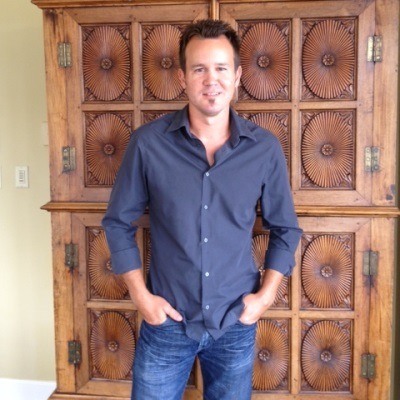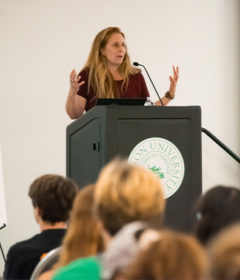Eric Davidson: from Tragedy to Triumph
 U. S. War Veteran Graduates SU at Celebration
U. S. War Veteran Graduates SU at Celebration
When you first meet this gracious man, there are absolutely no signs that Eric Davidson has experienced such trauma in his short life. He is strong, vibrant and cheerful. But as he tells his story, you cannot help but feel such admiration for a man who has endured so much pain and turmoil over the past 10 years.
Raised in a military family, his father a Naval veteran and brother a Marine, he lived in many cities in the United States. A new recruit who entered the U.S. Army in 1995, still in his late teens, he did his basic training in South Carolina and then his specialist training in Virginia.
His first assignment was to the DMZ in Korea completing his initial three year enlistment. While there he also sang for the U.S. Army band traveling throughout that country to entertain other soldiers. Upon completion, he came home to St. Cloud, Fla., continued his career in the United States Army Reserves and started a landscaping business.
In early 2001, he felt the need to reinlist, first as a Specialist but then quickly became a Sergeant. Dispatched to Kuwait in 2002, and as a member of the 3rd Infantry Division, he found himself among the first soldiers to enter Iraq at the start of the war, driving a tank on the “21 day March to Baghdad” to capture that city. He was present when the infamous statue of Saddam Hussein was pulled down.
“It was full-on war,” Davidson explains about the sustained two-week attack from the Republican Guard. The most organized part of their army, the guard was Saddam Hussein’s elite forces which specifically protected the capital city of Baghdad and the Iraqi leaders.
He described the intricate mathematical calculations he and his fellow soldiers performed to ascertain the exact coordinates and location of the rockets that were coming against them. Once measured, our troops would counter attack with MLRS artillery rockets within a two- to three-minute timeframe firing back in those exact positions and, consequently, would stop further attacks from those locations. Eventually, all the attacks stopped since the ‘guard’, Saddam’s biggest asset, had been killed. “It was quite an accomplishment,” he recalled. And it was the leadership skills he gained during this time that would sustain him later through his future injury.
It was during the high speed convoy of trucks that another truck slammed into his leaving the brake system impaired. The army mechanics tried to fix them in a very small timeframe and when they were unsuccessful, Davidson’s commander made the decision to leave him and his fellow soldier behind in the desert. But his resourcefulness rose within him and within a day he had fixed the brakes with only a hammer and duct tape. It then took another full day for them to catch up with their unit with no radio or gps.
During the continued drive to Baghdad, a rocket hit the back of his truck sending a concussive wave through causing a major brain injury. For the next two weeks he suffered 105 degree fevers within the already 130 degree outside temperature of the desert while still wearing his heavy helmet and gear. Yet he had to continue driving on with this unit.
In another instance, a 500 lb. bomb was dropped on his unit sending an additional concussive wave while also killing and maiming several of his fellow soldiers. And while, at the time, he only felt slightly disabled, seizures and migraine headaches began to take their effect on him. He believes the stress put upon his body at that time, including extensive sleep deprivation, contributed greatly to the extent of his head injury and later when MRI’s and EEG’s were taken it was confirmed he had a seizure disorder which continued three to five times each week for four years. It was at that point he needed to rest, work toward getting the proper medication balance and he was consequently retired.
During his 30-day stays at Walter Reed Medical Center, he was put on five medications, told he may need brain surgery, should have seizures for the remainder of his life and would never have children. Yet with sheer faith and determination, he has defied these odds.
Davidson made a clear decision that he would attend college, get his degree, become well, release all his medications, meet a wonderful woman who would become his wife and raise a family. And while it took nearly 10 years, he has accomplished all this and more.
He entered Stetson University’s Celebration campus to study business knowing he would complete his degree regardless of the Traumatic Brain Injury (TBI) which caused depression, poor speech and a limited ability to put sentences together.
“Stetson was the icing on the cake,” he enthusiastically explained. He feels Celebration’s campus was the perfect environment to be around fellow business students who were already out working in the world which helped shape and pull him out of his ‘shell’ or Post Traumatic Stress Disorder (PTSD).
Yet several times he would actually have seizures in class whereby he would black-out, and his eyes would stare straight ahead for up to an hour. He credits his professors at Stetson for their concern and support of him while he was dealing with these somewhat embarrassing aspects of his illness.
While in social entrepreneurship class at SU, his fellow students helped him evaluate the business plans for a new non-profit which he hopes will assist soldiers and their families after returning from war. “The only support vets receive is either financial or a simple pamphlet. There is no real ‘hands-on’ support to get through the emotional side of this,” he explains. That is his focus.
And while studying for his degree he additionally took the unprecedented step of intentionally withdrawing from all his medication over a one year timeframe, with the thought that once free of them, he would be well. And that is exactly what occurred. His body started to heal itself and he now feels better than he has in almost a decade.
Although Davidson has been challenged by his own severe TBI, his depression, fear and the additional emotional effects it has had on his wife and two young sons, he is a man with a mission to build an organization which will teach and support those who have had similar experiences. There is no doubt his faith, devotion to his fellow soldiers and his perseverance will help this man reach the pinnacle of life.
By Mary M. McCambridge



